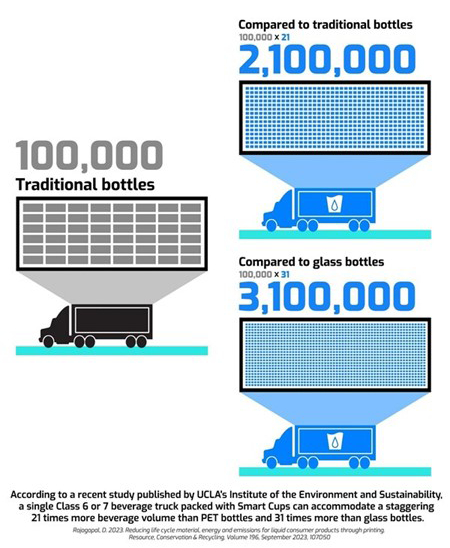UCLA Assesses Bioplastic Smart Cups for Sustainability
PLA bioplastic Smart Cups printed with ingredients are the focus of a study conducted by the university’s Institute of the Environment and Sustainability.
A sustainable shift to water-reducing and water-removing product concentrates has seen a range of options for powders to liquid versions. However, there remains just one “waterless beverage”: ingredient-printed Smart Cups, which we first reported on in early 2020, again in 2021, and most recently last year.
Consumers simply add water to the cups at the point of use. It’s a novel approach that offers major sustainability benefits.
But just how major?
On July 25, the well-respected journal, Resource, Conservation & Recycling, released a study on that very thing. Entitled "Reducing life cycle material, energy and emissions for liquid consumer products through printing," the study was conducted by UCLA's Institute of the Environment and Sustainability and authored by Professor Deepak Rajagopal. It shines a spotlight on what the report cites as “the remarkable potential of Smart Cups Technology in transforming the consumer-packaged goods industry and contributing to a greener future."
Smart Cups’ sustainability is all about the lack of water — and the trucks.
Smart Cups' efficient technology means fewer transportation vehicles needed with greater volume of products delivered.
"The technology that Smart Cups has pioneered has the potential to drastically reduce the environmental burden of beverages and several other liquid products through a reduction in total packaging and transportation across the product lifecycle," says Rajagopal. "The implications of this research extend beyond the consumer-packaged goods industry. Major companies, including industry giants like Pepsi, Coke, and Proctor and Gamble, could benefit from Smart Cups' ground-breaking approach to delivering products more sustainably. Embracing this innovation can help such large corporations achieve sustainability goals and become leaders in eco-friendly practices".
The study focused on the profound environmental benefits of Smart Cups Technology which enables direct printing of consumer product ingredients onto surfaces, leading to substantial reductions in packaging materials, energy consumption, carbon emissions and overall environmental burdens. It unveiled implications for not only the beverage industry, but also the consumer-packaged goods industry as whole, promising to revolutionize distribution logistics and minimize environmental impact.
|
Key highlights from the study include…
1. The study's findings show that a single Class 6 or 7 beverage truck packed with Smart Cups can accommodate a “staggering” 21 times more beverage volume than PET bottles and 31 times more than glass bottles.
2. When paired with tap water, Smart Cups made of polylactic acid (PLA) biopolymer use 20% less packaging materials than aluminum, 40% less than plastic, and an impressive 90% less than glass-based packaging.
3. This reduction in packaging translates into a 23% to 48% decrease in lifecycle primary energy and a 40% to 57% decrease in global warming potential. With biogenic carbon credit for landfilled PLA, the reductions reach an impressive 50% to 70%.
This research strengthens the validation of Smart Cups’ significant benefits. By eliminating the need for bulky packaging materials, such as PET bottles or glass containers, Smart Cups optimize beverage payload, allowing for substantially higher volumes to be transported within the same truck weight limits.
This breakthrough not only enhances logistical efficiency but also reduces the carbon footprint associated with transportation, as fewer trucks are required to transport the same amount of beverage
Chris Kanik, the visionary CEO of Smart Cups, was naturally excited by the results.
"We have spent so much time, money and energy on building infrastructure to provide water around the world. Why do we continue to ship it? This research highlights how Smart Cups Technology can change the world by streamlining distribution networks. Smart Cups is not just a company; it is a movement toward a brighter, more sustainable future for all. By leveraging advanced printing technology, Smart Cups is leading the charge towards a greener world, minimizing waste, and paving the way for responsible consumption. This research amplifies the positive impact Smart Cups Technology can have on the world, strengthening the validation of its significant benefits by reshaping the consumer products industry."
And when you consider that approximately 70% of PET bottles are not recycled, Smart Cups's sustainability make a compelling case.
To learn more about the study, you can view the full article at Scienceadirect.com to appear in the Resource, Conservation & Recycling journal’s September issue.
About the Author(s)
You May Also Like





